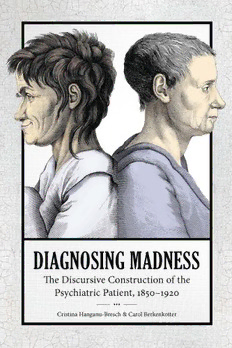Download Diagnosing Madness: The Discursive Construction Of The Psychiatric Patient, 1850-1920 PDF Free - Full Version
Download Diagnosing Madness: The Discursive Construction Of The Psychiatric Patient, 1850-1920 by Carol Berkenkotter, Cristina Hanganu-Bresch in PDF format completely FREE. No registration required, no payment needed. Get instant access to this valuable resource on PDFdrive.to!
About Diagnosing Madness: The Discursive Construction Of The Psychiatric Patient, 1850-1920
Diagnosing Madness is a study of the linguistic negotiations at the heart of mental illness identification and patient diagnosis. Through an examination of individual psychiatric case records from the late nineteenth and early twentieth centuries, Cristina Hanganu-Bresch and Carol Berkenkotter show how the work of psychiatry was navigated by patients, families, doctors, the general public, and the legal system. The results of examining those involved and their interactions show that the psychiatrist's task became one of constant persuasion, producing arguments surrounding diagnosis and asylum confinement that attempted to reconcile shifting definitions of disease and to respond to sociocultural pressures. By studying patient cases, the emerging literature of confinement, and patient accounts viewed alongside institutional records, the authors trace the evolving rhetoric of psychiatric disease, its impact on the treatment of patients, its implications for our contemporary understanding of mental illness, and the identity of the psychiatric patient. Diagnosing Madness helps elucidate the larger rhetorical forces that contributed to the eventual decline of the asylum and highlights the struggle for the professionalization of psychiatry.
Detailed Information
| Author: | Carol Berkenkotter, Cristina Hanganu-Bresch |
|---|---|
| Publication Year: | 2019 |
| ISBN: | 9781643360263 |
| Pages: | 193 |
| Language: | English |
| File Size: | 8.03 |
| Format: | |
| Price: | FREE |
Safe & Secure Download - No registration required
Why Choose PDFdrive for Your Free Diagnosing Madness: The Discursive Construction Of The Psychiatric Patient, 1850-1920 Download?
- 100% Free: No hidden fees or subscriptions required for one book every day.
- No Registration: Immediate access is available without creating accounts for one book every day.
- Safe and Secure: Clean downloads without malware or viruses
- Multiple Formats: PDF, MOBI, Mpub,... optimized for all devices
- Educational Resource: Supporting knowledge sharing and learning
Frequently Asked Questions
Is it really free to download Diagnosing Madness: The Discursive Construction Of The Psychiatric Patient, 1850-1920 PDF?
Yes, on https://PDFdrive.to you can download Diagnosing Madness: The Discursive Construction Of The Psychiatric Patient, 1850-1920 by Carol Berkenkotter, Cristina Hanganu-Bresch completely free. We don't require any payment, subscription, or registration to access this PDF file. For 3 books every day.
How can I read Diagnosing Madness: The Discursive Construction Of The Psychiatric Patient, 1850-1920 on my mobile device?
After downloading Diagnosing Madness: The Discursive Construction Of The Psychiatric Patient, 1850-1920 PDF, you can open it with any PDF reader app on your phone or tablet. We recommend using Adobe Acrobat Reader, Apple Books, or Google Play Books for the best reading experience.
Is this the full version of Diagnosing Madness: The Discursive Construction Of The Psychiatric Patient, 1850-1920?
Yes, this is the complete PDF version of Diagnosing Madness: The Discursive Construction Of The Psychiatric Patient, 1850-1920 by Carol Berkenkotter, Cristina Hanganu-Bresch. You will be able to read the entire content as in the printed version without missing any pages.
Is it legal to download Diagnosing Madness: The Discursive Construction Of The Psychiatric Patient, 1850-1920 PDF for free?
https://PDFdrive.to provides links to free educational resources available online. We do not store any files on our servers. Please be aware of copyright laws in your country before downloading.
The materials shared are intended for research, educational, and personal use in accordance with fair use principles.

